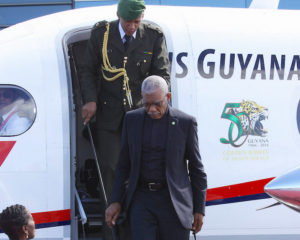
A representative of the Government was quoted in sections of the media as saying a private plane was chartered for President David Granger to fly to The Bahamas in March, on the grounds that it was the most “feasible option.”
But details about what was spent in total for the Trans Guyana Beechcraft airplane and also what benefits Guyana secured from the trip are yet to be shared.
According to Opposition parliamentarian and former Junior Finance Minister, Juan Edghill, a President’s trip overseas on behalf of the State is certainly not a private matter. As such, details should be made available to taxpayers.
The Government, he noted, in the interest of transparency and accountability to the people of Guyana, should release all the details. According to Edghill, “when the President travels, (it) is not a private matter. He is representing the state of Guyana.” “He is being funded by the State and the citizens of the State must at all times be fully aware of what it is costing the State for the President to represent the State,” Edghill said in a recent interview.
The President arrived in The Bahamas on March 2, as part of a three-day State visit which has been dubbed an ‘economic mission’. According to a report in a Bahamian newspaper, the President was expected to pay a courtesy call on the Governor General and then meet with the Guyanese Diaspora.
But reports are the chartered plane and the trip all together cost Guyanese taxpayers some G$18 million, as the President was accompanied by an entourage; which included Ministers and other personnel for whom accommodation was provided.
There has been no word on whether any bi-lateral trade agreements, prospective or otherwise, were secured in Guyana’s interest. Edghill was thus adamant that the State should officially make known what tangible benefits Guyana gained.
“The President must be able to show the country what benefits would have accrued to Guyana in the short-medium term as a result of this expenditure and spending,” Edghill said.
In a Government news report, it was related that the President visited and toured several industrial sites in Freeport, Bahamas, including the Grand Bahama Shipyard, where he said the visit to that country has been a learning lesson for Guyana for its future growth and development.
“So this is an important lesson for us in Guyana and for the other states in the Caribbean Community… So I’m very happy to be here. It’s a learning lesson for us. It’s a learning mission for us … (we’re) looking, listening and I think we have a lot of good lessons to take back to Guyana and to the rest of the Caribbean,” Granger was quoted saying.
Economic hardships
The millions of dollars reportedly spent on this trip come against the backdrop of an economic slowdown gripping the country. It is a slowdown even Finance Minister Winston Jordan has acknowledged.
Businesses have for some time been complaining of this economic slowdown, one which has forced some to lay off staff. In addition, there have been mass protests on an almost weekly basis against Government actions and policies deemed by many to be oppressive.
While these protests have been held by differing groups, they have all been linked to economic hardships these stakeholders are facing. Some of the most vociferous protests have been against Value Added Tax (VAT), 14 per cent of which has been imposed on private education fees.
While parents and teachers have taken to the streets on a number of occasions to voice their displeasure with the additional burden and petitions have been signed, Government has already indicated that the measure will not be reviewed until 2018.
This does not include the protests which greeted the decision to impose the 14 per cent VAT on water and electricity bills above a certain threshold; a first in recent history. Stakeholders have called on the Government to remove tax on such essential services.
Then there is the Guyana Gold and Diamond Miners Association (GGDMA), which has for some time been calling, in vain, for a meeting with the President to discuss the problems afflicting the mining industry.
In a recent statement, it again expressed frustration about the tax regulations and the effect it is having on small- and medium-scale miners. The Association spoke of the fact that while they are publicly recognised for their economical contributions, the ‘bread and butter’ issues affecting them are ignored. Among these are the unavailability of concessions on fuel and other materials.
Other aggrieved groups include sugar workers, who have for months been protesting against the social effects caused by the Government downsizing the industry by closing estates. The moves have put many out of work, as alternate options offered to them were not feasible.



